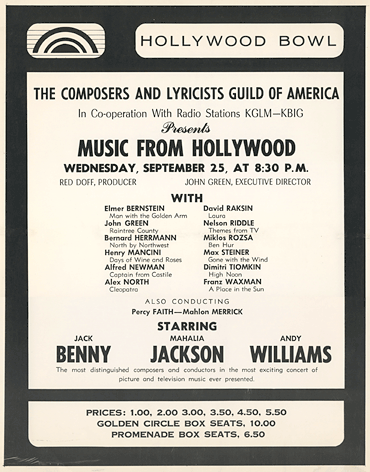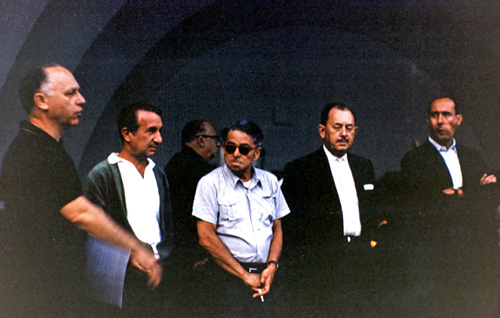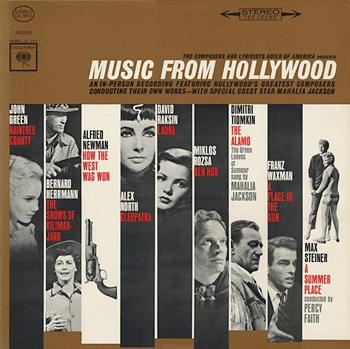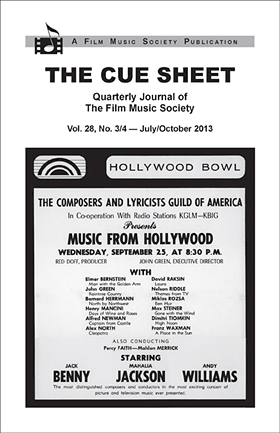

  |
|
|
||||||||||||||||||||||
|
FMS FEATURE... September 23, 2013 "Music from Hollywood" 50th Anniversary A look back at the greatest film music concert of all time by Jon Burlingame  Every important composer then working in Hollywood was there, and nearly all of them conducted their own music before an admiring crowd. It was called "Music From Hollywood," and it was sponsored by the Composers and Lyricists Guild of America (CLGA), the only union that film and television composers ever had, and one that does not exist today. It was hosted by John Green, the longtime music director of MGM and veteran Bowl conductor. The special guests were popular singer Andy Williams, famed gospel headliner Mahalia Jackson, and comedian-violinist Jack Benny. But the real attraction for film-music fans was the astounding lineup of composers, many of whom were making their Los Angeles public-conducting debuts. In alphabetical order, they were: Elmer Bernstein, Green, Bernard Herrmann, Henry Mancini, Alfred Newman, Alex North, David Raksin, Nelson Riddle, Miklos Rozsa, Dimitri Tiomkin and Franz Waxman. In the audience was Max Steiner, whose music was conducted by arranger Percy Faith. And although we can't say for certain, it's very likely that composers George Duning, Hugo Friedhofer, Ernest Gold, Leigh Harline and Bronislau Kaper – all of whom had their most famous compositions performed – were also present. The extraordinary Oscar record of this group: Sixty Academy Awards and 310 Oscar nominations (not to mention multiple Emmys and Grammys). And while the CLGA billed it as the "first annual" event, no concert even remotely similar to this was ever again staged in Hollywood. The idea originated with CLGA board member and songwriter Harold Spina ("It's So Nice to Have a Man Around the House"). It was produced by publicist-manager-producer Red Doff (Andy Hardy Comes Home) and scripted by TV and film writer John D.F. Black (The Untouchables, later Star Trek and Hawaii Five-0). Tickets were priced at $10 for "golden circle" box seats, $6.50 for "promenade box seats," and then from $5.50 down to $1. Top contractor Bobby Helfer assembled an 88-piece orchestra, including many of the finest studio players in Hollywood. The concert began at 8:30 p.m. The temperature had soared to 107 degrees that day – the highest reading in eight years – and everyone who attended remembers that it was still quite warm that evening, possibly still in the 90s when the concert started. "I remember it being very hot," says Film Music Foundation treasurer Les T. Zador, whose father Eugene Zador had orchestrated for Miklos Rozsa for many years. At the refreshment stands, he said, "I think they ran out of Coca-Cola."  Rehearsing final bows, left to right: David Raksin, Alex North, Alfred Newman, Mahlon Merrick, Henry Mancini. As Variety later reported, Green's one misstep as host that night was that he nearly forgot to introduce Steiner in the audience after Faith conducted his two famous themes. The first of the evening's non-film-music stars was the appearance of Jack Benny, doing comic business with his violin and playing a condensed, humor-filled performance of Wieniawski's second violin concerto with his longtime conductor Mahlon Merrick at the podium. Later reviews were unanimous in their praise of Benny as "hilariously funny." Act II opened with seven minutes of Rozsa's Ben-Hur (1959), followed by a new eight-minute suite from Waxman's A Place in the Sun (1951) and a Mancini medley of Days of Wine and Roses (1962), "Baby Elephant Walk" from Hatari! (1962) and his TV theme Peter Gunn (1958). Mancini remained onstage to conduct a 10-minute medley, arranged by Johnny Mandel, of Oscar-winning songs sung by Andy Williams: "Love Is a Many-Splendored Thing" (1955), "Mona Lisa" (1950), "On the Atcheson, Topeka and the Santa Fe" (1946), "All the Way" (1957) and "Moon River" (1961). Alfred Newman conducted his themes from How the West Was Won (1962) and Captain From Castile (1947) and Tiomkin appeared to conduct Morton Gould's arrangement of High Noon (1952) and Stanley Wilson's arrangement of "The Green Leaves of Summer" from The Alamo (1960) sung by Miss Jackson. Green re-appeared to conduct an eight-minute "Film Theme Fantasy" (arranged by Alexander Courage) consisting of themes from Pinocchio (Harline, 1940), The Best Years of Our Lives (Friedhofer, 1946), Picnic (Duning, 1955), Exodus (Gold, 1960) and Lili (Kaper, 1953). The concert concluded around 11:30 p.m.  So a second "Music From Hollywood" concert was held on April 5, 1964, this time with actor Ray Milland hosting and Mel Torme replacing Andy Williams as guest vocalist. Jack Benny did not appear. Pieces reprised from the September concert included How the West Was Won, Raintree County, Laura and Cleopatra, all with the composers conducting; plus the "Film Theme Fantasy" and Oscar song medley. Instead of Ben-Hur, Rozsa conducted his Spellbound Concerto, perhaps because of the extra visual value of being able to see Dr. Samuel Hoffman perform the theremin solos. Alex North was presented the first (and believed to be only) CLGA award for "most distinguished film score of 1963" for his music for Cleopatra. This International Hour aired on the five CBS owned-and-operated stations on different dates in May 1964; on 10 "educational" stations after that; and in 10 other countries. No video copy of this 51-minute television special is known to survive. The poor financial receipts from the 1963 concert and negative reviews for the 1964 TV show apparently doomed the "Music From Hollywood" concept. The CLGA never tried it again. Says conductor John Mauceri, who conducted at the Bowl for many years: "This was a moment where the composers got together and said, 'This is what we do, this is a little slice of our legacy.' Fifty years later, I keep imagining who I would want to hear conduct today's version of that concert. How extraordinary that would be." David Newman, whose father Alfred participated in both concerts and who has gone on to his own career as a respected conductor of classic film music, said this: "I don't think there ever has been a more star-studded concert than the Sept. 25, 1963 concert at the Hollywood Bowl.  "Film music is a true American art form that deserves the performance, study, thought and press that any other concert music enjoys. What it must have been like to be there, hearing this thrilling music, from these legends, live!" Editor's note: This month, The Film Music Society's quarterly journal The Cue Sheet will publish a lavishly illustrated, 9,000-word chronicle of this event (how it came about, a detailed look at the concert, how a television special resulted, and more) that will be both distributed to members and for sale to the public. Included are many never-before-seen photographs from the collections of composers David Raksin and Alexander Courage, and extensive excerpts from the script by John D.F. Black.©2013 Jon Burlingame |
Search
Past Features
Feature Archives
|